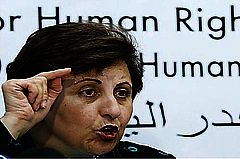Shirin Ebadi: Arrangements Should Not be Made to Conflict With People’s Interests
» Human Rights after the Nuclear Statement in Lausanne
Rooz spoke with prominent Iranian human rights activist and Nobel Peace prize winner about the impact of the recent nuclear framework agreement between Iran and the five major powers in Lausanne, Switzerland. Here are the excerpts.
Rooz: Do you believe that as the West and Iran come to an understanding on the nuclear program, human rights issues will be pushed to the side?
Ebadi: While this agreement has not provided anything to Iran, it remains a very positive political step. It will result in less sanctions and consequently less economic pressure on the Iranian people. What impact this has on the human rights situation in Iran will depend on how human rights activists proceed. We must utilize everything at our disposal to document and display to the whole world any and all human rights violations that take place in Iran and in this way influence world public opinion on this issue. In the West, politicians need people’s votes to be elected so it is our responsibility to inform them of this. This is especially true of those human rights activists who reside outside Iran because they enjoy freedom of speech and are not constrained by the restriction that exist inside Iran. The other issue is that Western governments should not forego the values that they proclaim to uphold and to which they are committed for economic benefits.
Rooz: Americans have said that Iran’s human rights issues and missile technology will be dealt with in the final comprehensive agreement in June. How optimistic are you that this will actually take place?
Ebadi: Some sanctions in the US and the European Union are already implemented against Iran because of its human rights violations. There is also a list of names of individuals who are violators of human rights whose cross-border movements are banned. The Lausanne arrangement does not touch these sanctions. Included in the list are the names of judge Salavati, Pirabbasi, Moghiese and Mortezavi (the former Tehran prosecutor). Countries that have enacted these travel restriction on these violators should bear in mind that in Iran individuals who work for its security apparatus have multiple names and multiple identity cards and passports with different names. So Mr. Mortezavi for example can travel under a different name and passport than his own. The United States and Western countries must show to Iranian people that working for a nondemocratic regime that is a violator of human rights comes with a cost.
Rooz: What is the impact of this agreement on the Iranian people?
Ebadi: If it’s provisions are implemented, they will obviously reduce economic pressure on people. They will also be able to attend to more important issues such as freedom, censorship, discrimination, etc. this is my hope.
Rooz: What is the responsibility of human rights activists?
Ebadi: They must work more than before. Especially in the field of preparing reports on violations of human rights. They must get closer to people and carefully monitor arrangements that Iran enters with other countries and not allow these to come to the detriment of human rights. I remember a number of journalists such as Isa Saharkhiz were arrested because of cellphone technology that was provided to the Iranian government by Nokia Siemens. We, including myself, met with representatives of Nokia and protested its sale of eavesdropping equipment to the Iranian government. The result was that the company announced it was not going to extend its sales agreement with the Iranian government. So, the lifting of sanctions should not come at a cost to the Iranian people.



